Related Research Articles
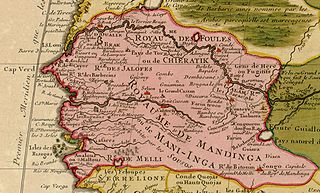
The history of Senegal is commonly divided into a number of periods, encompassing the prehistoric era, the precolonial period, colonialism, and the contemporary era.
The Principality of Bethio was a small monarchy located for centuries along the lower Senegal River valley, on the border between modern Mauritania and Senegal, in the northeast of Biffeche. In the 18th century it was also called the "Royaume d'Oral." Its capital was at Poum, then moved to N'Dombo, and finally moved to Ross, Senegal in the 19th century. The original, fertile farmlands of Bethio are in a region just east of the Djoudj National Bird Sanctuary.
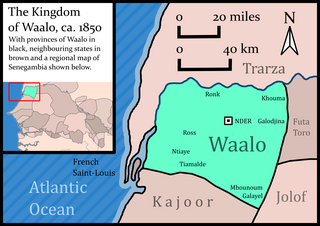
Waalo was a kingdom on the lower Senegal River in West Africa, in what is now Senegal and Mauritania. It included parts of the valley proper and areas north and south, extending to the Atlantic Ocean. To the north were Moorish emirates; to the south was the kingdom of Cayor; to the east was Jolof.
The Lebu are an ethnic group of Senegal, West Africa, living on the peninsula of Cap-Vert. The Lebu are primarily a fishing community, but they have a substantial business in construction supplies and real estate. They speak Lebu Wolof, which is closely related to Wolof proper but is not intelligible with it. Their political and spiritual capital is at Layene, situated in the Yoff neighborhood of northern Dakar. They have a religious sect and theocracy, the Layene, headquartered there.
The Senegambia is, in the narrow sense, a historical name for a geographical region in West Africa, which lies between the Senegal River in the north and the Gambia River in the south. However, there are also text sources which state that Senegambia is understood in a broader sense and equated with the term the Western region. This refers to the coastal areas between Senegal and Sierra Leone, where the inland border in the east was not further defined.

Boubacar Boris Diop is a Senegalese novelist, journalist and screenwriter. His best known work, Murambi, le livre des ossements, is the fictional account of a notorious massacre during the Rwandan genocide of 1994. He is also the founder of Sol, an independent newspaper in Senegal, and the author of many books, political works, plays and screenplays. Doomi Golo (2003) is one of the only novels ever written in Wolof; it deals with the life of a Senegalese Wolof family. The book was published by Papyrus Afrique, Dakar.

Île de Gorée is one of the 19 communes d'arrondissement of the city of Dakar, Senegal. It is an 18.2-hectare (45-acre) island located 2 kilometres at sea from the main harbour of Dakar, famous as a destination for people interested in the Atlantic slave trade.

Cheikh Anta Diop was a Senegalese historian, anthropologist, physicist, and politician who studied the human race's origins and pre-colonial African culture. Diop's work is considered foundational to the theory of Afrocentricity, though he himself never described himself as an Afrocentrist. The questions he posed about cultural bias in scientific research contributed greatly to the postcolonial turn in the study of African civilizations.

Cheikh Anta Diop University, also known as the Cheikh Anta Diop University of Dakar, is a university in Dakar, Senegal. It is named after the Senegalese physicist, historian and anthropologist Cheikh Anta Diop and has an enrollment of over 60,000.
Brak was the title of the kings of the kingdoms of Waalo and Biffeche on the Senegal River in Senegal and Mauritania in West Africa until the 19th century.
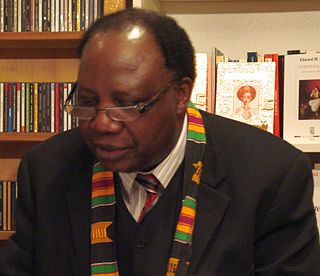
Théophile Obenga is professor emeritus in the Africana Studies Center at San Francisco State University. He is a politically active proponent of Pan-Africanism and an Afrocentrist. Obenga is an Egyptologist, linguist, and historian.
Trade unionism is a powerful force in the politics, economy, and culture of Senegal, and was one of the earliest trades union movements to form in Francophone West Africa.
The French conquest of Senegal started in 1659 with the establishment of Saint-Louis, Senegal, followed by the French capture of the island of Gorée from the Dutch in 1677, but would only become a full-scale campaign in the 19th century.
Maad a Signig Kumba Ndoffene Famak Joof was the King of Sine in modern-day Senegal. Maad a Sinig means king of Sine. He ruled from 1853 until his death on 23 August 1871. He was the son of Maad Souka Ndela Joof and Lingeer Gnilane Jogoy Joof. His father – Maad Souka Ndela came from The Royal House of Semou Njekeh Joof founded by Maad Semou Njekeh Joof in the early 18th century, which was the third and last Royal House of Joof family of Sine and Saloum. His paternal family ruled three Kingdoms : Sine, Kingdom of Saloum and previously the Kingdom of Baol. They descended from Maad Ndaah Njemeh Joof the 13th century King of Lâ (Laah) in Baol.

Lingeer Fatim Beye Joos Fadiou was a 14th-century Serer princess and queen (Lingeer) from the Kingdom of Sine. She is the matriarch and early ancestor of the Joos Maternal Dynasty of Waalo. She is usually regarded by some sources as the founder of the Joos Maternal Dynasty. The pre-colonial Kingdoms of Sine and Waalo now lies within present-day Senegal. Her surname is Beye (English-Gambia) or Bèye (French-Senegal). Joos Fadiou is her maternal clan. In Serer, "Fa-tim" means "the maternal clan of..."

The Joos Maternal Dynasty was a Serer maternal dynasty which originated from the Serer pre-colonial Kingdom of Sine in the 14th century and spread to the Wolof Kingdom of Waalo. The matriarch or founder of this maternal dynasty was Lingeer Fatim Beye, a princess and queen originally from the Kingdom of Sine. In Waalo, it was founded by the princess Lingeer Ndoye Demba of Sine. Lingeer Ndoye Demba was the maternal granddaughter of Lingeer Fatim Beye. They both came from the Serer ethnic group. Although the pre-colonial Kingdoms of Sine and Waalo now form part of modern-day Senegal, in pre-colonial Senegambia, present-day Gambia had open-borders with Senegal and share the same historical and cultural heritage. The demarcation of the two countries is purely geographical due to their colonial past, with Britain colonizing the Gambia and France colonizing Senegal. For a background to these events see the History of Senegal, History of the Gambia, Senegambia and Timeline of Serer history.
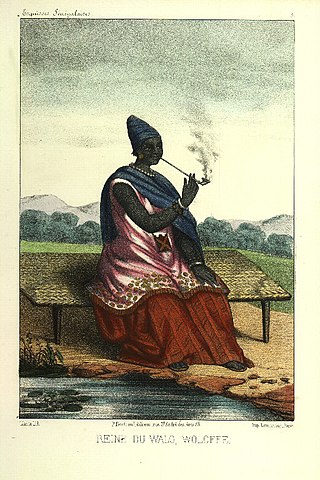
Ndaté Yalla Mbodj, also known as Ndateh Yalla Mbooj, was the last Lingeer (Queen) of Waalo, a Jolof kingdom located in what is now northwest Senegal. During her reign, she fought against French colonization and Moorish invasion of her kingdom. Ndaté Yalla and her sister Ndjeumbeut Mbodj were two of the most powerful women of 19th century Senegalese dynastic history.
Amadou Bâ, also known as Doudou Ba, was a Senegalese politician, adjunct to the mayor of Dakar and minister.
Aboubacry Moussa Lam, also known as Boubacar Lam, was born in 1953 and is a Peul Senegalese historian, disciple of Cheikh Anta Diop, who was his primary advisor on his major work, De l'Origine Égyptienne des Peuls, and a professor of Egyptology in the Department of History at the Cheikh Anta Diop University. Lam has been credited with being the most important Diop scholar and being "most helpful and inspiring in defining the nature of the Afrocentric school of thought." Boubacar has been active in seeking to recenter Africans back in their own historical and social context. Lam was also a signatory to an appeal to preserve the Timbuktu Manuscripts. In January 2018, he was listed as a writer and lecturer at Dakar University as well as a participant in the Association for the Development of Education in Africa (ADEA)'s and the Global Book Alliance (GBA)'s African Publishers and Other Book Industry Stakeholders Regional Meeting.
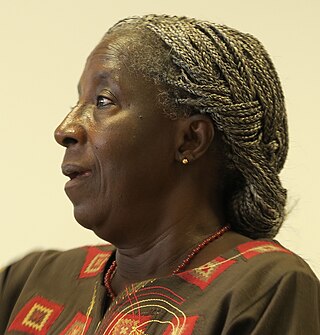
Fatou Sow is a Senegalese feminist sociologist specialising in sociology of gender.
References
- ↑ "Distinguished Africanist Award". africanstudies.org. African Studies Association. 2022. Retrieved 27 October 2022.
- ↑ Klein, Martin (Nov 1, 2016). "AHA Activities Boubakar Barry, Historian of Senegambia, Selected as 2016 Honorary Foreign Member". historians.org. American Historical Association. Retrieved 27 October 2022.